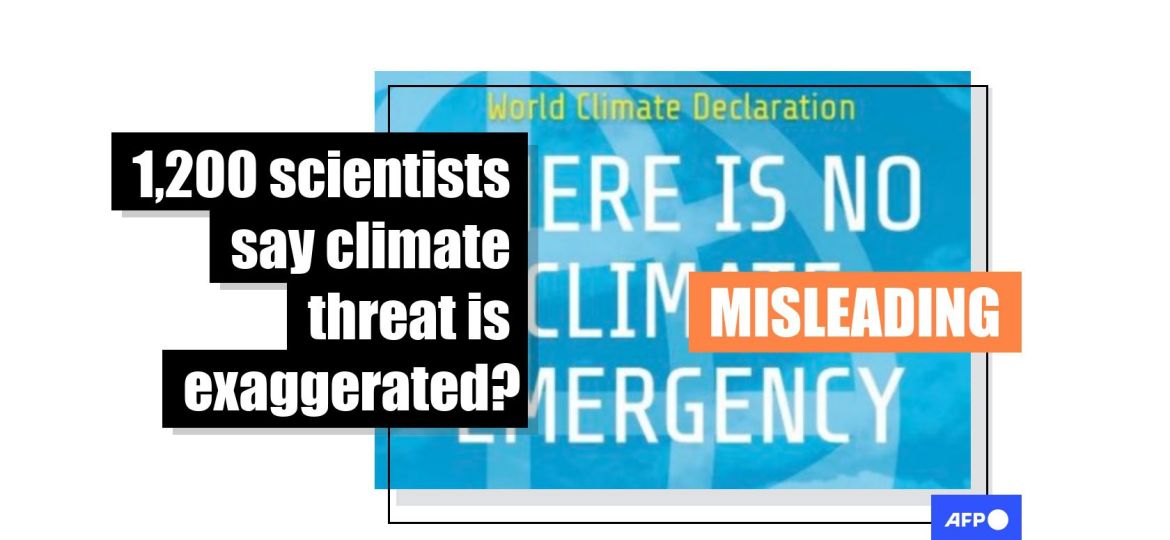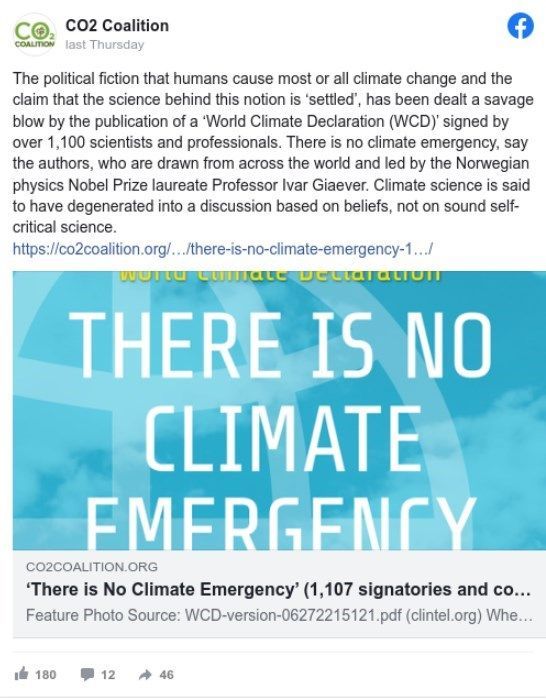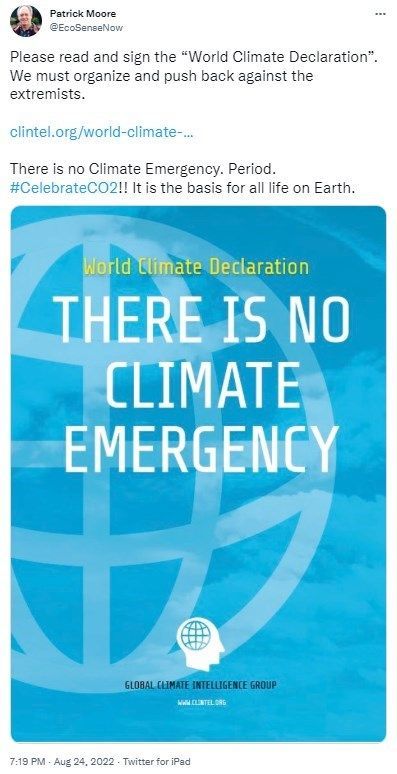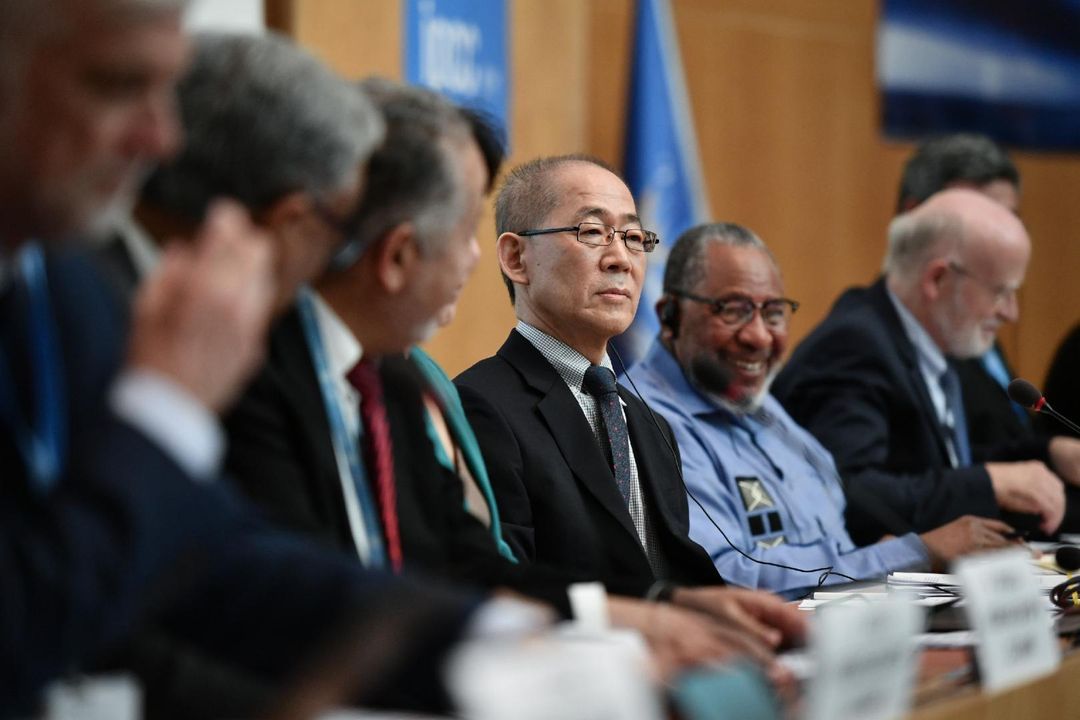
A “World Climate Declaration” signed by more than 1,200 people and widely shared on social media challenges the scientific consensus on human-driven climate change. But only a small number of the signatories are climate scientists, some have links to the oil industry or climate-skeptic organizations, and the claims have been widely debunked.
“A global network of over 1200 scientists and professionals has prepared this urgent message. Climate science should be less political, while climate policies should be more scientific,” says the text of the declaration under the title: “There is no climate emergency.”
The declaration was shared on platforms including Facebook, Instagram and Twitter in August 2022.
 Screenshot of a Facebook post taken September 6, 2022
Screenshot of a Facebook post taken September 6, 2022
 Screenshot of a Tweet taken on September 6, 2022
Screenshot of a Tweet taken on September 6, 2022
Fossil fuel links
It was an updated version of a text published in 2020 by the Netherlands-based group Climate Intelligence (CLINTEL), founded by Guus Berkhout, a retired geophysicist who has worked for oil giant Shell, and journalist Marcel Crok.
CLINTEL describes itself as an “independent foundation” and touts the text’s signatories as “a large variety of competent scientists.”
Its founders have denied two reports in Dutch media that money from fossil fuel companies was channeled to fund Berkhout’s climate-skeptic work. “Clintel never received a penny from the oil industry,” Crok told AFP in an email on September 2, 2022.
Among five oil companies named in the Dutch reports, Shell told AFP in an email it was “not aware” of having funded Berkhout and ExxonMobil said the claim it had funded Clintel was “inaccurate”. Three other companies declined to comment.
However seven of the signatories to the declaration were identified on the listas having worked for Shell and eight others as having worked in the oil industry. Crok confirmed to AFP that Berkhout himself worked for the firm “about 40 years ago.” Besides these, there were 13 petroleum engineers and petroleum geologists, plus several mining specialists.
Several signatories had links, either mentioned on the list or documented elsewhere,to US climate-skeptic free-market groups with ties to the oil industry: the Heartland Institute, the Competitive Enterprise Institute and the Cato Institute.
These groups each received money from oil giant ExxonMobil, according to donor and tax documents published by Greenpeace (here, here and here). The company has been accused of undermining science to protect its fossil fuel business — a charge it denies.
 Oil company Shell denied knowledge of funding climate-skeptic work (AFP / Paul ELLIS)
Oil company Shell denied knowledge of funding climate-skeptic work (AFP / Paul ELLIS)
Handful of climatologists
The declaration’s claims are followed by a list of around 1,200 signatories from at least 40 countries, six listed as deceased at the time of publication of this article. Twenty-six of them are dubbed “World Climate Declaration Ambassadors,” one of whom is dead.
One of the signatories is Ivar Giaever, a joint winner of the Nobel Prize for Physics in 1973 for work on superconductors. Google Scholar indicates that he has not published any papers on climate science.
According to an AFP count of the declaration’s signatories, about 10 explicitly described themselves as climatologists or climate scientists, fewer than one percent of the total. A few others described themselves as specialists in paleoclimatology and atmospheric sciences.
There were approximately 40 geophysicists, 130 geologists and 200 engineers of various kinds, plus several mathematicians, medical doctors and agricultural scientists.
 Signatories to the World Climate Declaration included politicians, healthcare professionals and figures from the arts
Signatories to the World Climate Declaration included politicians, healthcare professionals and figures from the artsAmong the job titles of the other signatories were fisherman, airline pilot, sommelier, musician, lawyer, linguist, retired teacher, urologist, psychoanalyst and at least three energy workers’ union representatives.
The specialist fact-checking site Climate Feedback in an analysis of an earlier version of the declaration, rated it as “biased,” citing the significant number of fossil-fuel employees among the signatories. It also published an assessment of the latest declaration letter.
“Given the volume of inaccurate claims made in the letter… it is perhaps surprising that ‘1,200 scientists and professionals’ agree with its content. It is, however, instructive to examine the credentials of the signatories,” Climate Feedback’s authors wrote.
IPCC: hundreds of studies
Documents accrediting the mainstream scientific view on climate change are more comprehensive than the World Climate Declaration. The Intergovernmental Panel on Climate Change invited 721 experts from 90 countries to be authors and editors of its three-part Sixth Assessment Report, released between August 2021 and April 2022.
The report constitutes the most comprehensive assessment of scientific knowledge on climate change. Each part was some 3,000 pages long. The authors reviewed hundreds of studies that were listed in the reference sections. It says there is “unequivocal” evidence that humans are warming the climate by burning fossil fuels.
Numerous posts on social media have cast doubt on the consensus among climate scientists that humans are driving global warming by burning fossil fuels. However three analyses of climate studies in recent years have indicated the consensus is close to 100 percent (here, here and here).
 Reports by the IPCC are the most comprehensive assessment of the science on climate change (AFP / Fabrice COFFRINI)
Reports by the IPCC are the most comprehensive assessment of the science on climate change (AFP / Fabrice COFFRINI)
False climate claims
Despite this consensus, the declaration’s text implies that various aspects of the science of climate change are still up for debate. “It is not the number of experts but the quality of arguments that counts,” it says.
The declaration includes a series of climate science claims that have been debunked by climate experts. It gives no sources. AFP and other organizations have previously fact-checked several of the claims:
1. “Earth’s climate has varied as long as the planet has existed, with natural cold and warm phases… Therefore, it is no surprise that we now are experiencing a period of warming.”
Experts cited in this AFP fact check said that the surge in global temperatures over the past 150 years has been abnormally sharp, driven by carbon emissions following industrialization.
2. “The world has warmed significantly less than predicted by IPCC on the basis of modeled anthropogenic forcing… Climate policy relies on inadequate models.”
This analysis by Carbon Brief showed that some models projected less warming than experienced and some projected more, but all showed surface temperature increases between 1970 and 2016 that were not far from what actually occurred. Experts defended the models in this AFP fact check.
3. “More CO2 is favorable for nature, greening our planet. Additional CO2 in the air has promoted growth in global plant biomass. “
Experts cited in this article by AFP Fact Check’s German service said that plants can only process a limited share of the excess carbon dioxide emissions and suffer from the effects of climate change.
4. “There is no statistical evidence that global warming is intensifying hurricanes, floods, droughts and suchlike natural disasters, or making them more frequent. “
World Weather Attribution (WWA), using methods including observational analysis of historic datasets, has calculated that various disasters were made more likely due to climate change, including floods and storms. Its methods are described in this AFP fact check on wildfires.
Read AFP’s other fact checks about climate change here.
